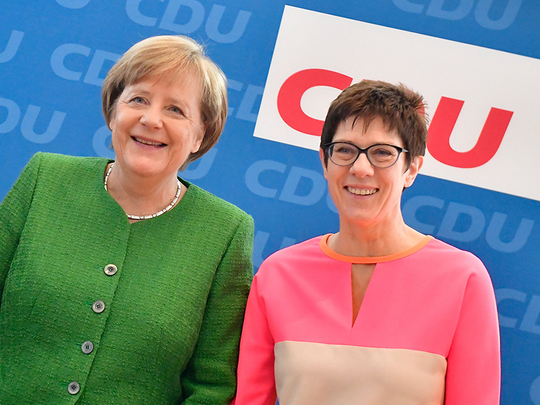
Berlin: It’s a move the world is watching with interest as the German polity is poised for a change.
The announcement by Chancellor Angela Merkel that the day-to-day operations of her party will be run by the governor of Germany’s tiny western state of Saarland, Annegret Kramp-Karrenbauer, is a precursor to what many believe will be the anointment of Kramp-Karrenbauer to eventually succeed Merkel as leader of the centre-right Christian Democratic Union.
Merkel said she wants the party to elect Kramp-Karrenbauer to the post of general-secretary next Monday. The party’s current general-secretary, Peter Tauber, is stepping down after facing health issues.
Known as AKK, Kramp-Karrenbauer is said to possess the qualities that will help her adequately fill in the formidable shoes of Merkel. A member of the CDU’s executive committee, Kramp-Karrenbauer has governed Saarland — a state of about a million people on the border with France and Luxembourg — since 2011. She led the party to its fifth straight state regional victory in March 2017, dealing a blow to the SPD’s surge a year ago after Martin Schulz emerged as the surprise chancellery candidate.
AKK is described by observers as a steely individual, moulded by conservative values and grit that have seen her steer CDU to repeated shows of strength as a governor.
A close ally of Merkel, AKK elicited sure confidence from Merkel at the party headquarters in Berlin last week as she pointed to the way forward for CDU. Referring to AKK as an experienced, 55-year-old Catholic who would bring credibility to the party at a time when the Christian Democrats are under pressure to define their political positions, Merkel said, “This is about strengthening the CDU at all of its roots, not only in one — but in its full breadth.”
A centrist who supported Merkel’s initial open-border policy during the 2015-2016 refugee crisis, AKK has been on the shortlist of party grandees considered to eventually replace Merkel. Her years as governor of Saarland have seen her working to make French a second language in the state and improve economic, cultural and political ties with France.
Kramp-Karrenbauer, a mother of three, is seen among the group of conservative women politicians in Germany who have built for themselves a strong career even as they have run their homes successfully.
In the role of the general secretary, AKK will manage the party and oversee election campaigns. Merkel herself took the job in 1998 after the CDU was ousted from government after 16 years in power under Helmut Kohl. Less than two years later she took over the party leadership.
Merkel, who is aiming to be sworn in to her fourth term as German leader next month after more than 12 years in office, has come under fresh internal pressure to arrange a succession. After the CDU suffered its worst electoral result since 1949 in September, Merkel surrendered two powerful ministries to the Social Democrats as part of a coalition agreement earlier this month. The accord is going to a vote by the full SPD membership.
Conservative voters have abandoned the party in recent years, partly over Merkel’s welcoming stance on immigration, even though it still came first in last September’s election with almost 33 per cent of the vote.
“We are experiencing one of the most difficult political phases in the history of (post-war) Germany,” Kramp-Karrenbauer told reporters, explaining why she was willing to leave her post as governor of one of Germany’s 16 states to devote her energy to the party’s headquarters in Berlin.
Asked whether she considered herself Merkel’s “crown princess” now, Kramp-Karrenbauer, said: “I was never suited for princess roles.”
Agencies












